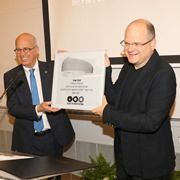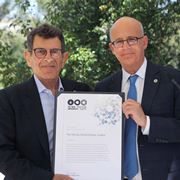Bridging the Academic Gender Gap
In 2016 Dr. Ines Zucker was one of five outstanding TAU women PhD graduates who received a TAU-funded fellowship that enabled them to pursue post-doctoral studies at leading universities overseas. In her case, it was at Yale University, where she since completed her post-doc on nano-powered environmental applications.
Now a Senior Lecturer at TAU’s School of Mechanical Engineering and Porter School of Environmental and Earth Sciences, Zucker is a true success story of TAU’s drive to ensure that more women researchers reach senior positions in the Israeli academy.
“I received a fellowship from Yale, but it was contingent on attaining matching funding,” she says. “The additional fellowship I received from TAU is what allowed me to successfully complete my post-doc. With two children to support, I couldn’t have done it otherwise.”
Dr. Zucker believes that providing such fellowships is key to redressing the underrepresentation of women in prestigious tenured positions: “I believe that awarding post-doc fellowships to women researchers will have an immediate impact on women choosing an academic career, especially in fields like engineering.”
Closing the Gender Gap in Academia
Although 58% of the PhD students at Tel Aviv University are women, they are dramatically outnumbered by men at the level of faculty member. Women constitute 35% of senior lecturers, 31% of associate professors and only 20% of tenured professors. This gap is wider in the exact sciences, where women constitute 32% of PhD students, yet only 15% of senior lecturers, 7% of associate professors and 5% of tenured professors. In engineering, the picture is even bleaker. This "leaking pipeline" can be attributed to several factors, including the family-work conflict, gender bias, the dominance of men in admission committees and cultural norms.
While the gender gap among academic faculty is not an exclusively Israeli phenomenon, Israeli women completing their doctoral studies face a unique obstacle: just like all researchers seeking a faculty position in Israel they must have conducted their post-doctoral research abroad in order to be a competitive and attractive candidate. This is particularly true in the STEM fields (science, technology, engineering and math), but also increasingly so in the social sciences, humanities, business and law. In other words, as one TAU recruitment committee member put it, “When we have one job applicant with a post-doc from an illustrious school in the US and another one without, who do you think we are going to choose?”
Recent data published by the Israeli Central Bureau of Statistics show that one third of Israeli PhDs are interested in pursuing post-doctoral research and, ultimately, an academic career. Yet, while 78% of men choose to study abroad, only 52% of women do so. The overriding cultural norm in Israel is that women follow their husbands overseas for career relocation, but rarely the opposite.
Women who do consider relocating overseas for post-doctoral positions must overcome a sizable financial barrier. Hosting universities usually offer fellowships to post-doctoral researchers, but the sum is simply not enough for women to move their families overseas where their husbands generally don’t get work visas and they must be the main breadwinner. Hence, women face a double barrier that makes it harder for them to continue on the academic path.
Fellowships: Making all the Difference
At Tel Aviv University, over 130 talented women complete their doctoral degrees each year. As part of its commitment to increasing the number of young women who choose to pursue post-doctoral research abroad, TAU appointed a Special Advisor to the President on Gender Equality. This office encourages more women to pursue advanced degrees across campus, and offers fellowships for those who choose to pursue post-doctoral research abroad. Approximately 50 bright young researchers apply annually for the five TAU-funded fellowships on offer.

Natalie Shefer, who recently completed her PhD at TAU’s Coller School of Management, is among those outstanding researchers. She hopes to return to TAU as a faculty member after she completes her post-doc at INSEAD, one of the leading business schools in the world today.
For her, a post-doc at an overseas university is a must: “It’s an opportunity to work with leading international researchers, conduct research at the highest standards and expand the range of methodologies and tools I can draw on.”
Natalie Shefer
In her case too, a fellowship would be a real game-changer: “I received a partial post-doc fellowship from TAU’s Coller School of Management and I see this as a huge vote of confidence in my abilities and academic potential. As it’s only a partial fellowship, my family won’t be moving to France with me at this point; rather, I will be traveling periodically between France and Israel. If I had received a full fellowship, it would have allowed me to take my family with me.”






